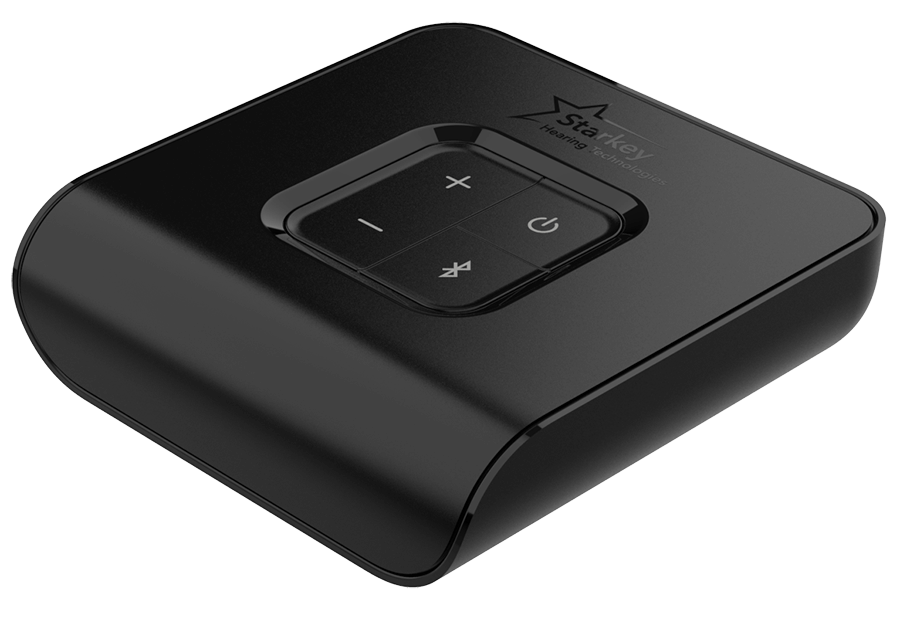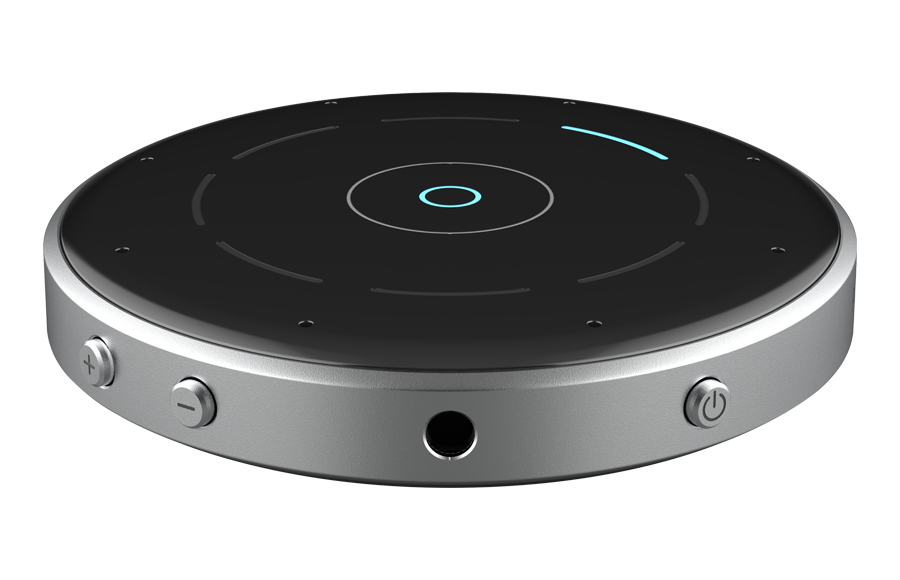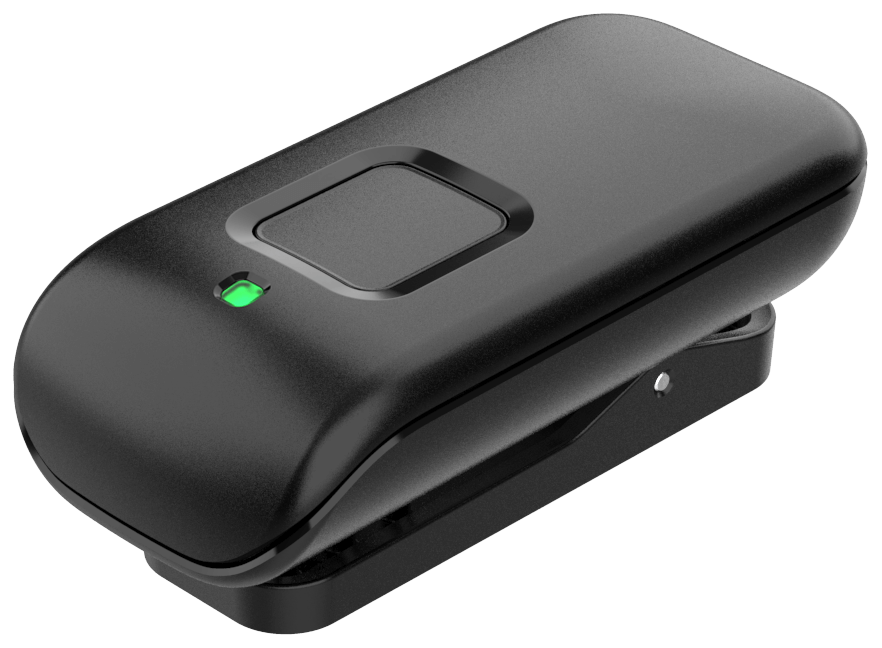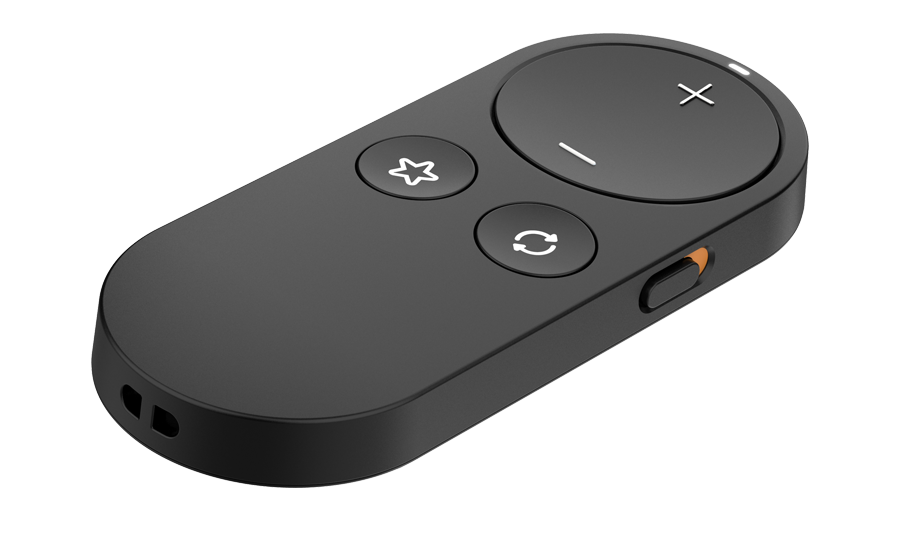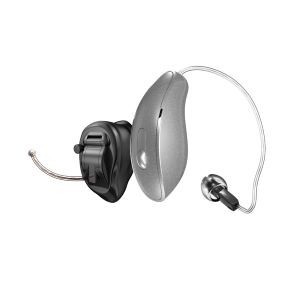Starkey Edge AI
- Better speech identification
- Reduced listening effort and fatigue
- Water-resistant to 1 meter for 30 minutes & upto 51 hours of battery
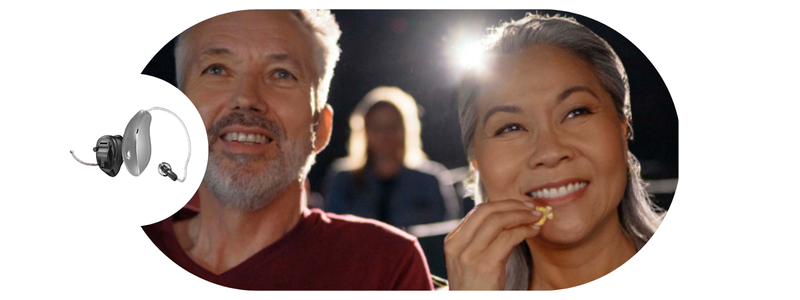
Starkey Edge AI Hearing Aids
Reviews, Styles, Features & Benefits
Introduction
Listening is a complex process that comes naturally to a normally hearing brain but becomes challenging with hearing loss. Starkey Edge AI’s innovative technology is said to stimulate the brain’s auditory cortex to address this disruption. It classifies intricate sound environments, enhances speech clarity, and minimises background noise in real-time, all powered by advanced AI.
The modern design of the Edge AI hearing aids is sleek, discreet, and comfortable, making them barely noticeable to others. With the industry’s longest-lasting rechargeable battery, you can now enjoy up to 51 hours of listening on a single charge. Plus, they’re built to withstand the elements, being waterproof, sweatproof, and everyday-proof, so you don't have to worry about getting them wet.
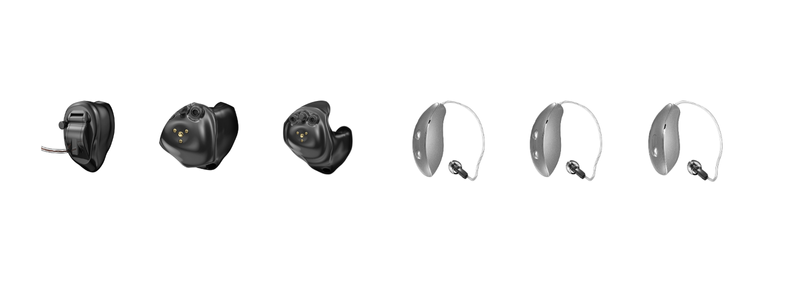
Hearing aid models
Starkey Edge AI hearing aids are available in six styles, including rechargeable Receiver-in-Canal (RIC) models, size 312 disposable battery options, rechargeable In-the-Ear (ITE) and In-the-Canal models, as well as a Completely-in-Canal (CIC) version with a size 312 battery.
These hearing aids are offered in three technology tiers (24, 20, and 16) to accommodate a range of hearing loss from mild to severe. Plus, two models are CROS-compatible for those with single-sided deafness: the RIC RT and RIC 312.
Custom options
- Starkey Edge AI CIC: Completely in Canal hearing aid model with Bluetooth and traditional battery. This custom-fit model fits snugly inside the ear canal, making it virtually invisible. It’s the perfect option for those seeking a discreet appearance while enjoying the benefits of Edge Mode+ and effective noise reduction.
- Starkey Edge AI ITC R: In the Canal rechargeable water-resistant hearing aid model with Bluetooth offers a mix of comfort and customisation. It's ideal for users who want a balance of visibility and ease of use, with options for advanced connectivity.
- Starkey Edge AI ITE R: In the Ear rechargeable water-resistant hearing aid model with Bluetooth offers a comfortable fit and is perfect for users looking for simplicity, enhanced power, and control. The ITE R model comes with connectivity options and Edge Mode+ for exceptional sound clarity in different environments.
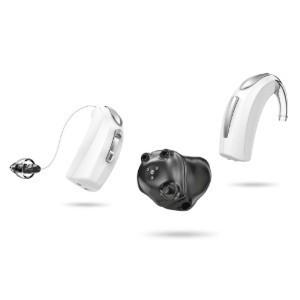
Behind-Ear options
- Starkey Edge AI RIC 312: Receiver in Canal hearing aid model with Bluetooth, traditional battery and compatible with CROS. With its small, discreet design, the RIC 312 uses replaceable 312 batteries, offering a low-maintenance solution for those who value compactness and advanced sound processing.
- Starkey Edge AI RIC R T: Rechargeable Receiver in Canal water-resistant hearing aid model with Bluetooth, compatible with CROS, and includes a telecoil. Improving compatibility with hearing loop systems in public spaces. It’s designed for users who prioritise connectivity and accessibility.
- Starkey Edge AI mRIC R: Small rechargeable Receiver in Canal water-resistant hearing aid model with Bluetooth. This rechargeable model offers a compact design paired with powerful performance, delivering up to 51 hours of battery life. It’s perfect for users who prefer convenience and extended power without relying on disposable batteries.
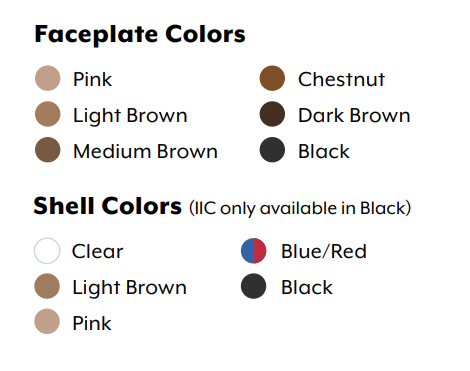
Hearing Aid Colours
Starkey Edge AI hearing aids are available in a variety of colours, so you can choose the perfect match for your style and preferences. Your audiologist will help you find the best solution tailored to your unique hearing needs and requirements.
Behind-Ear colours available: Chestnut, tech black, graphite grey, silver, white, caramel, and beige.
Custom shell colours available: Clear, Pink, Light Brown, Blue/Red, and Black.
Custom faceplate colours available: Light Brown, Medium Brown, Chestnut, Dark Brown, and Black.
My Starkey App
Designed with input from hearing aid wearers, My Starkey promises to seamlessly integrate with Edge AI and Genesis AI hearing aids to enhance your listening experiences, improve your well-being, and simplify daily life.
Compatible with the new Apple Watch for even more convenience
User-friendly and easy to navigate, the app offers benefits that extend beyond just better hearing. You can adjust hearing aid settings, stream calls, and even locate lost aids with its comprehensive control features.
It also uses the science of the ear to accurately count steps, track engagement, and help you meet your wellness goals. Plus, you can translate languages, set reminders, and enjoy a variety of features designed to make life easier.
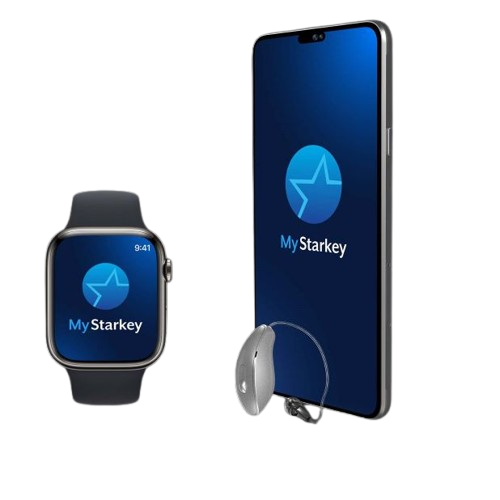
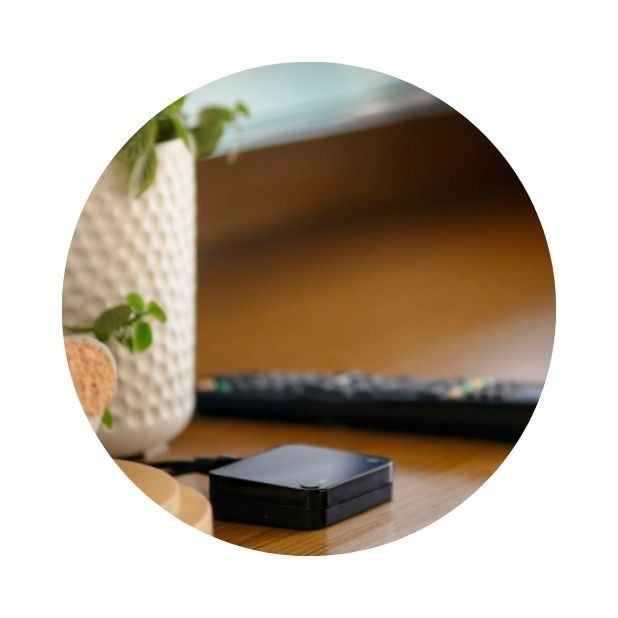
New TV Streamer and Bluetooth Updates
Introducing the new StarkLink Edge TV Streamer, which is future-proof and Auracast-ready. It utilises Bluetooth Low Energy (LE) Audio protocol to deliver high-fidelity audio directly from your TV to any paired LE Audio-enabled hearing aids.
Auracast ready
The new Bluetooth Low Energy (LE) Audio streaming protocol consumes less power while providing a next-generation connectivity standard for all your devices.
It pairs effortlessly, connects rapidly, and offers a more reliable streaming experience. Enjoy universal compatibility with Apple iOS and the latest Android phones, ensuring you're future-proofed and ready to stream Auracast broadcasts.
Plus, it works seamlessly with the new StarLink Edge TV Streamer.
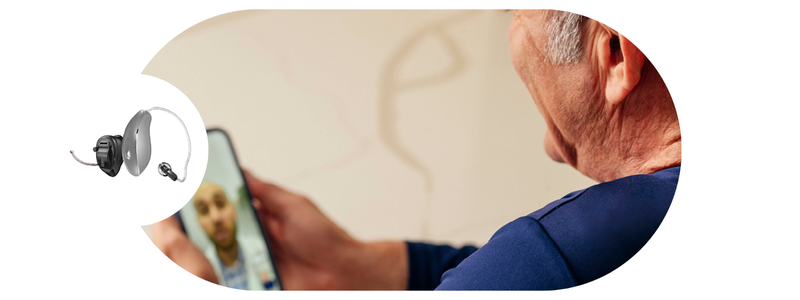
Starkey Edge AI Hearing Aids
Bluetooth Connectivity and Compatible Accessories
Connect easily
Bluetooth hearing aids, also known as wireless hearing aids, are designed to effortlessly connect to other Bluetooth-enabled devices like smartphones, tablets, TVs, and audio equipment. This enhances your control, convenience, and options for your hearing aids like never before. Such as:
- Receive calls directly in your hearing aids from your smartphone or tablet.
- Enjoy TV at your preferred volume with wireless accessories.
- Stream music directly from your smartphone, tablet, or other devices to your hearing aids.
- Manage your hearing aids and track your health through the My Starkey app.
Benefits of Bluetooth
Bluetooth hearing aids enable you to fully immerse yourself in your surroundings:
- Customise your hearing experience: Streaming allows you to enjoy audio on your terms, privately and tailored to your preferences.
- Stay connected: Stream phone calls, video chats, and more, keeping you in touch with others effortlessly.
- Enhance your cognitive engagement: Increased connectivity options encourage more interaction and activity, helping to keep your brain sharp.
What accessories are compatible?
Connecting to Bluetooth accessories simplifies the control of your hearing aids, enhances audio streaming, and improves your ability to hear those nearby. These essential tools include: TV Streamers, Table Microphones, Remote Microphones, Mini Remote Microphones, and Remotes.
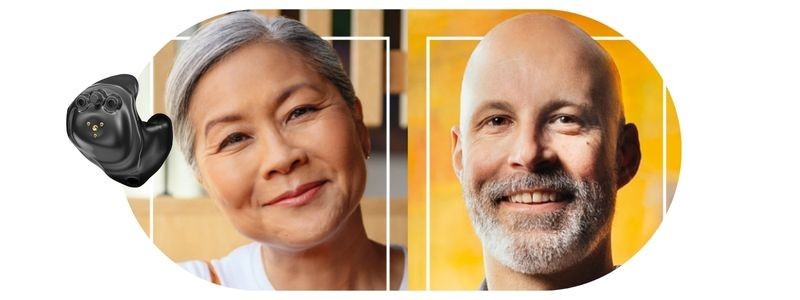
Starkey Edge AI Hearing Aids
Main Features
Advanced Sound Processing
Featuring deep neural network (DNN) technology, Edge AI hearing aids mimic how the human brain processes sound. This "Neuro Processor" enhances speech clarity and reduces background noise, providing up to 13 decibels of improvement in challenging environments. DNN processing is always active, with an optional "Edge Mode+" for more aggressive adaptation to changing conditions.
The advancements brought about by Starkey's DNN have led to the most significant improvements in this range. However, the enhancements made with Edge AI are also substantial. Starkey has packed an impressive amount of technology into the Edge AI hearing aids while still achieving the best battery life in the industry to date, lasting up to 51 hours.
New G2 Neuro Processor
The 2023 Genesis AI model from Starkey featured the Neuro Processor, its smallest and most powerful chip yet, with six times more transistors and four times the speed of previous models.
Now, Starkey has introduced the G2 Neuro Processor, which adds a neural processing unit (NPU) designed for advanced AI and machine learning tasks. NPUs enhance capabilities in smartphones, smart home devices, and smartwatches, and Starkey claims that Edge AI is the first hearing aid to fully integrate an NPU, offering 100 times more DNN processing than Genesis AI.
As a result, Starkey states that Edge AI is 30% more accurate in speech recognition, which, if true, indicates a significantly improved signal-to-noise ratio (SNR). This enhancement will help users better understand speech in noisy environments, as even minor SNR improvements can greatly enhance speech recognition.
Seamless connectivity, longevity, and durability
Equipped with upgraded Bluetooth technology and the LC3 codec, Edge AI hearing aids provide enhanced audio streaming from smartphones, tablets, and PCs. They also support Auracast technology for direct audio streaming from public venues, offering improved audio quality and connectivity range.
With Pro8 HydraShield technology, these hearing aids feature eight protective layers for moisture and corrosion resistance, achieving an IP68+ certification for water and dust resistance. They can withstand daily wear, including exposure to sweat and rain.
Health monitoring and voice-activated assistant
Edge AI hearing aids include built-in motion sensors to detect falls and send alerts to designated contacts. A new feature assesses fall risk using the CDC's STEADI protocol, helping users improve their balance from home.
These hearing aids also come with a voice-activated assistant powered by generative AI, allowing users to control settings and access information through simple voice commands, enhancing the overall user experience.
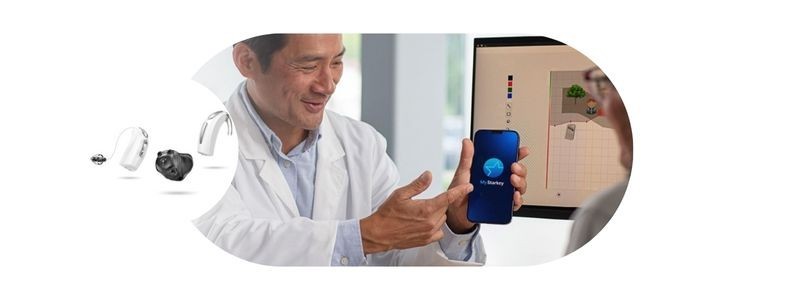
Starkey Edge AI vs Genesis AI
What is the difference?
Improvements since Genesis AI
The main difference between Starkey Edge AI and Genesis AI hearing aids is in their technology and features. Edge AI is powered by the advanced G2 Neuro Processor, which offers 100 times more processing power than Genesis AI. This boost simply leads to enhanced sound processing, better speech recognition, and improved noise reduction.
Edge AI also features Bluetooth Low-Energy (LE) connectivity, a Smart Audio Assistant, and an upgraded Edge Mode+ that operates automatically. While both models provide excellent hearing solutions, Edge AI stands out as a significant technological upgrade, perfect for those looking for advanced AI features.
How can AI help your hearing?
AI in hearing aids makes these devices smarter and more focused on individual needs. For example, with AI technology, hearing aids can automatically adjust their settings depending on the environment, switching from a bustling restaurant mode to a quieter conversation mode. This allows users to enjoy clearer sound without the hassle of manual adjustments.
AI also learns from users' preferences over time, adapting to their unique listening habits and enhancing the overall experience. It’s like having a personal assistant who ensures you hear your best in any situation.
Watch the Starkey Edge AI hearing aid video below
Comparing the Starkey Edge AI hearing aid performance levels

In Summary
The new hearing aid features X100 times more DNN processing power than Genesis AI, Neuro Sound Technology 2.0, and a sensor for listening intention and forward focus.
It offers up to 13 dB better speech clarity in noise and 6 dB better noise reduction. LE Audio and Auracast provide double the streaming range and connect directly to Windows 11+.
Battery life lasts up to 40 hours on mRIC and 50 hours on RIC. Features include health tracking, fall detection, Full Edge+ mode, real-time translation into 27 languages, and a 'find my smartphone' and 'find my hearing aids' function.
It also has quick charging, improved Bluetooth, and telecare support.
Have any questions?
Here, at Hearing Aid UK, we offer a wide range of hearing aids available on the market - keeping up to date with the best and latest hearing aid technology.
We can support your hearing healthcare in clinic or in the comfort of your own home and with nationwide coverage, we will have an audiologist near you.
Whatever your hearing loss level, budget, or style our audiologists can help you find the perfect hearing solution for you.
Call us free for support and advice on 0800 567 7621
What's included in our hearing aid prices?
Other pages you might find useful
If you are looking at this page then it is likely that an audiologist has suggested that you purchase this particular hearing aid, so is this the best model for you?
In general, any audiologist will always recommend to you the model that best suits your needs. Here is a useful checklist to make sure that is the case.
- Audiologist level of knowledge: The audiologist you have seen will hopefully have a wide knowledge of all available hearing aids, however, some will only be familiar with a small number of brands and therefore may not really be in a position to know which model is the best for you. It is OK to challenge their recommendation and ask them to justify why this particular brand is the one for you.
- Do research: Read about the hearing aid that was recommended. Does it seem like it will suit your lifestyle? Does it have more or fewer features than you need?
- Be aware of sales targets: Many high street retailers have specific tie-ins to a particular manufacturer/brand. The hearing aid they have suggested may still be the correct one for you, but do your research so that you know why they might have recommended it.
If in doubt, feel free to give us a call. That's what we're here for. In the meantime, read all about our review of the best hearing aids for 2025 here
If you have significant hearing loss in both ears, you should be wearing two hearing aids. Here are the audiological reasons why:
Localisation: The brain decodes information from both ears and compares and contrasts them. By analysing the minuscule time delays as well as the difference in the loudness of each sound reaching the ears, the person is able to accurately locate a sound source. Simply put, if you have better hearing on one side than the other, you can't accurately tell what direction sounds are coming from.
Less amplification is required: A phenomenon known as “binaural summation” means that the hearing aids can be set at a lower and more natural volume setting than if you wore only one hearing aid.
Head shadow effect: High frequencies, the part of your hearing that gives clarity and meaning to speech sounds, cannot bend around your head. Only low frequencies can. Therefore if someone is talking on your unaided side you are likely to hear that they are speaking, but be unable to tell what they have said.
Noise reduction: The brain has its own built-in noise reduction which is only really effective when it is receiving information from both ears. If only one ear is aided, even with the best hearing aid in the world, it will be difficult for you to hear in background noise as your brain is trying to retain all of the sounds (including background noise) rather than filtering it out.
Sound quality: We are designed to hear in stereo. Only hearing from one side sounds a lot less natural to us.
Fancy some further reading on this topic? You can read about why two hearing aids are better than one in our article, hearing aids for both ears, here
For most people, the main benefit of a rechargeable hearing aid is simple convenience. We are used to plugging in our phones and other devices overnight for them to charge up. Here are some other pros and cons:
For anybody with poor dexterity or issues with their fingers, having a rechargeable aid makes a huge difference as normal hearing aid batteries are quite small and some people find them fiddly to change.
One downside is that if you forget to charge your hearing aid, then it is a problem that can't be instantly fixed. For most a 30-minute charge will get you at least two or three hours of hearing, but if you are the type of person who is likely to forget to plug them in regularly then you're probably better off with standard batteries.
Rechargeable aids are also a little bit bigger and are only available in Behind the Ear models.
Finally, just like with a mobile phone, the amount of charge you get on day one is not going to be the same as you get a few years down the line. Be sure to ask what the policy is with the manufacturer warranty when it comes to replacing the battery.
Looking for more information on rechargeable hearing aids? Read our dedicated page on the topic here
For most people, the answer is yes. But it's never that simple.
The majority of hearing problems affect the high frequencies a lot more than the low ones. Therefore open fitting hearing aids sound a lot more natural and ones that block your ears up can make your own voice sound like you are talking with your head in a bucket. Therefore in-ear aids tend to be less natural.
However the true answer is we can't tell until we have had a look in your ears to assess the size of your ear canal, and until we have tested your hearing to see which frequencies are being affected.
People with wider ear canals tend to have more flexibility, also there are open fitting modular CIC hearing aids now that do not block your ears.
There is also the age old rule to consider, that a hearing aid will not help you if it's sat in the drawer gathering dust. If the only hearing aid you would be happy wearing is one that people can't see, then that's what you should get.
Most people can adapt to any type of hearing aid, as long as they know what to expect. Have an honest conversation with your audiologist as to what your needs are.
Generally speaking, six or more. Unless it's none at all.
The number of channels a hearing aid has is often a simplistic way an audiologist will use to explain why one hearing aid is better than another, but channels are complex and it is really not that straightforward. Here are some reasons why:
Hearing aids amplify sounds of different frequencies by different amounts. Most people have lost more high frequencies than low and therefore need more amplification in the high frequencies. The range of sounds you hear are split into frequency bands or channels and the hearing aids are set to provide the right amount of hearing at each frequency level.
Less than six channels and this cannot be done with much accuracy, so six is the magic number. However, a six channel aid is typically very basic with few other features and is suitable only for hearing a single speaker in a quiet room. The number of channels is not what you should be looking at, it's more the rest of the technology that comes with them.
As a final note, different manufacturers have different approaches. One method is not necessarily better than any other. For example, some manufacturers have as many as 64 channels in their top aids. Most tend to have between 17 and 20. One manufacturer has no channels at all.
Hearing aids are easily lost, misplaced or damaged and typically are one of the most expensive personal possessions an individual can own. We offer hearing aid warranty coverage for £80 per year per aid. Find out more about this service we provide here
All our audiologists use the very latest technology and provide the full range of tests to accurately measure your hearing for free. Find out about what hearing healthcare services we offer all our customers here
Hearing Aid UK offers all their customers free home visiting services, even in a care home environment, for no extra cost. Including hearing tests, fittings, maintenance, check-ups and much more in the comfort of your own home and at your convenience. Find out more information about our home visits here
Here, at Hearing Aid UK, we are dedicated to offering low hearing aid prices. We achieve this by having no head office and low marketing costs. Our hearing aid prices are amongst the lowest you will find anywhere in the world. Explore our prices, brands, and models here
Explore the Starkey Edge AI hearing aid range
Ask the Experts
6 Morton Lane
Walkwood
Redditch
Worcestershire
B97 5QA
Latest Launch
When we refer to a product as 'Latest Launch', we mean it is the latest to be released on the market.
New
When we refer to a product as 'New', we mean that the product is the newest hearing aid model on the market.
When we refer to a product as 'Superseded', we mean that there is a newer range available which replaces and improves on this product.
Older Model
When we refer to a product as an 'Older Model', we mean that it is has been superseded by at least two more recent hearing aid ranges.


